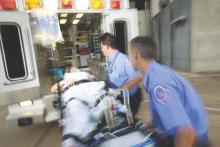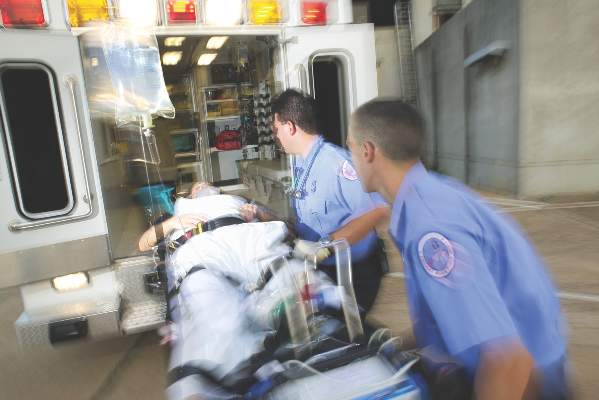User login
SAN ANTONIO – Don’t withhold antiplatelet or heparin therapy in patients with blunt cerebrovascular injury, even if they have concomitant traumatic brain or solid organ injuries, advised researchers from the University of Tennessee Health Science Center, Memphis.
With close monitoring, “initiation of early antithrombotic therapy for patients with BCVI [blunt cerebrovascular injury] and concomitant TBI [traumatic brain injury] or SOI [solid organ injury] does not increase the risk of worsening TBI or SOI above baseline.” It is safe, effective, and “should not be withheld,” the researchers concluded after a review of 119 BCVI patients with concomitant injuries.
Seventy four (62%) had TBIs, 26 (22%) had SOIs, and 19 (16%) had both. At some institutions, antithrombotic therapy – the mainstay for BCVI to prevent secondary ischemic stroke – would have been delayed or withheld for fear of triggering hemorrhagic complications.
But at the Health Science Center in Memphis, “we have an extremely cooperative group of neurosurgeons who take BCVI as seriously as we do, and actually allow us, more often than not, to start antithrombotic therapy pretty much immediately after the injury is identified,” investigator and surgery resident Dr. Charles Shahan said at the annual scientific assembly of the Eastern Association for the Surgery of Trauma.
As a result, 85 patients (71%) received heparin infusions with goal-activated partial thromboplastin times of 45-60 seconds, and the rest antiplatelet therapy, typically 81-mg aspirin. The center generally uses heparin for TBI patients because of its short half-life, and aspirin for others.
Antithrombosed BCVI patients did as well as did historical controls. TBIs deteriorated – meaning worsening on clinical or CT exam, or delayed operative intervention – in 7%, vs. 10% of TBI patients without BCVI (P = .34). Three percent of SOI patients had delayed laparotomies vs. 5% of SOI patients without BCVI (P = .54). None of the BCVI patients stopped antithrombotics because of complications.
The results held regardless of the type of TBI, SOI, or antithrombotic used.
Overall, 11 patients (9%) had BCVI-related strokes. Without antithrombotic therapy, stroke rates in BCVI can approach 40%.
“Our extremely early use of antithrombotic therapy does not appear to increase our rate of worsening of our hemorrhagic injures and also gets our stroke rate within acceptable limits,” Dr. Shahan said.
The mean age in the study was 38, and just over half the subjects were men.
Dr. Shahan had no disclosures
SAN ANTONIO – Don’t withhold antiplatelet or heparin therapy in patients with blunt cerebrovascular injury, even if they have concomitant traumatic brain or solid organ injuries, advised researchers from the University of Tennessee Health Science Center, Memphis.
With close monitoring, “initiation of early antithrombotic therapy for patients with BCVI [blunt cerebrovascular injury] and concomitant TBI [traumatic brain injury] or SOI [solid organ injury] does not increase the risk of worsening TBI or SOI above baseline.” It is safe, effective, and “should not be withheld,” the researchers concluded after a review of 119 BCVI patients with concomitant injuries.
Seventy four (62%) had TBIs, 26 (22%) had SOIs, and 19 (16%) had both. At some institutions, antithrombotic therapy – the mainstay for BCVI to prevent secondary ischemic stroke – would have been delayed or withheld for fear of triggering hemorrhagic complications.
But at the Health Science Center in Memphis, “we have an extremely cooperative group of neurosurgeons who take BCVI as seriously as we do, and actually allow us, more often than not, to start antithrombotic therapy pretty much immediately after the injury is identified,” investigator and surgery resident Dr. Charles Shahan said at the annual scientific assembly of the Eastern Association for the Surgery of Trauma.
As a result, 85 patients (71%) received heparin infusions with goal-activated partial thromboplastin times of 45-60 seconds, and the rest antiplatelet therapy, typically 81-mg aspirin. The center generally uses heparin for TBI patients because of its short half-life, and aspirin for others.
Antithrombosed BCVI patients did as well as did historical controls. TBIs deteriorated – meaning worsening on clinical or CT exam, or delayed operative intervention – in 7%, vs. 10% of TBI patients without BCVI (P = .34). Three percent of SOI patients had delayed laparotomies vs. 5% of SOI patients without BCVI (P = .54). None of the BCVI patients stopped antithrombotics because of complications.
The results held regardless of the type of TBI, SOI, or antithrombotic used.
Overall, 11 patients (9%) had BCVI-related strokes. Without antithrombotic therapy, stroke rates in BCVI can approach 40%.
“Our extremely early use of antithrombotic therapy does not appear to increase our rate of worsening of our hemorrhagic injures and also gets our stroke rate within acceptable limits,” Dr. Shahan said.
The mean age in the study was 38, and just over half the subjects were men.
Dr. Shahan had no disclosures
SAN ANTONIO – Don’t withhold antiplatelet or heparin therapy in patients with blunt cerebrovascular injury, even if they have concomitant traumatic brain or solid organ injuries, advised researchers from the University of Tennessee Health Science Center, Memphis.
With close monitoring, “initiation of early antithrombotic therapy for patients with BCVI [blunt cerebrovascular injury] and concomitant TBI [traumatic brain injury] or SOI [solid organ injury] does not increase the risk of worsening TBI or SOI above baseline.” It is safe, effective, and “should not be withheld,” the researchers concluded after a review of 119 BCVI patients with concomitant injuries.
Seventy four (62%) had TBIs, 26 (22%) had SOIs, and 19 (16%) had both. At some institutions, antithrombotic therapy – the mainstay for BCVI to prevent secondary ischemic stroke – would have been delayed or withheld for fear of triggering hemorrhagic complications.
But at the Health Science Center in Memphis, “we have an extremely cooperative group of neurosurgeons who take BCVI as seriously as we do, and actually allow us, more often than not, to start antithrombotic therapy pretty much immediately after the injury is identified,” investigator and surgery resident Dr. Charles Shahan said at the annual scientific assembly of the Eastern Association for the Surgery of Trauma.
As a result, 85 patients (71%) received heparin infusions with goal-activated partial thromboplastin times of 45-60 seconds, and the rest antiplatelet therapy, typically 81-mg aspirin. The center generally uses heparin for TBI patients because of its short half-life, and aspirin for others.
Antithrombosed BCVI patients did as well as did historical controls. TBIs deteriorated – meaning worsening on clinical or CT exam, or delayed operative intervention – in 7%, vs. 10% of TBI patients without BCVI (P = .34). Three percent of SOI patients had delayed laparotomies vs. 5% of SOI patients without BCVI (P = .54). None of the BCVI patients stopped antithrombotics because of complications.
The results held regardless of the type of TBI, SOI, or antithrombotic used.
Overall, 11 patients (9%) had BCVI-related strokes. Without antithrombotic therapy, stroke rates in BCVI can approach 40%.
“Our extremely early use of antithrombotic therapy does not appear to increase our rate of worsening of our hemorrhagic injures and also gets our stroke rate within acceptable limits,” Dr. Shahan said.
The mean age in the study was 38, and just over half the subjects were men.
Dr. Shahan had no disclosures
AT THE EAST SCIENTIFIC ASSEMBLY
Key clinical point: Antithrombotics for BCVI do not make concomitant brain and solid organ injuries worse.
Major finding: TBIs deteriorated in 7% of BCVI patients on heparin infusion, versus 10% of TBI patients without BCVI (P = .34).
Data source: Review of 119 BCVI patients.
Disclosures: The lead investigator had no disclosures.

